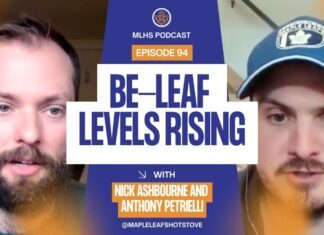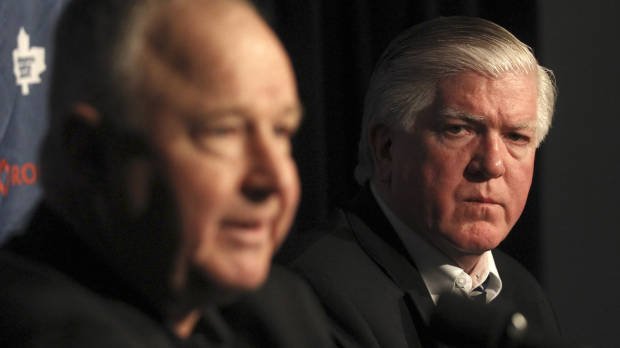
Sometimes, there’s really just nothing left to say.
After the Leafs 7-1 loss to the Philadelphia Flyers, they officially hit that point. You can only talk about the same things so many times before it just becomes tiring, old, and frankly, a waste of time.
Preceding Toronto’s shellacking to the Flyers, they played about as lackluster a game as you will ever see at the NHL level, in a 3-0 loss to the Carolina Hurricanes. Yes, they summoned some pride against Buffalo and played, all things considered, a solid game. But it wasn’t chalk full of meaning in this situation, at this time of year.
Thus, we’re changing gears to the summer and some serious things the Leafs need to look at and address. If you’re expecting trade proposals, and a guess at what the Leafs roster “should” look like next season, you can look elsewhere. Rather, I want to go through some fundamental, foundational questions the Leafs seriously need to ask themselves in the coming months, and then figure out ways to properly address the problems.
This has been a season of many ups and downs. While there are positives that can be found, at the end of the day, you are what the standings say you are. The Leafs are arguably not as bad as their positioning in the standings will indicate once the season is over – I certainly would argue that – but it doesn’t matter. Ultimately, every team is judged the exact same way, by a point system that rewards wins, and favourable results. And ultimately, the Leafs utterly failed when it came to keeping up with the big boys.
With that said, the job for management will be to go back and look at this team when they were successful – and there is a large sample to draw from – and figure out:
1) What exactly made them successful.
2) What went wrong.
3) What caused the things that went wrong.
4) How to prevent that from happening again.
5) How to build on what was once a promising group.
The Leafs aren’t in the first year of a rebuild. They can’t just throw bodies on the ice and see what happens right now. They have to go back, look for positives, see what they can take out of those positives to apply to next season – talent, speed, the ability to score in rapid succession – and then figure out how to fill in the rest of the holes. Obviously there are problems here, but to say there were not positives this season would be foolish. This was a good team for a large chunk of the season and even if they did show their “true colours” in crunch time, it does not mean that there is nothing for management to look to build on from this season. There was.
With that in mind, here are four things that the Leafs need to look at and figure out during the coming months.
Establish your Leadership group:
If one thing is clear, it’s that Dion Phaneuf is going nowhere as captain, which is fine (more on that below). However, how are they supplementing and supporting him as captain? The Leafs two assistant captains are, of course, Colby Armstrong and Mike Komisarek. Both are great personalities that appear to be great guys, but when you are struggling to even get in the lineup, it belittles any leadership and mentoring ability those two have to offer.
Bettina Lehnert, a psychologist, says that a sense of belonging, contribution and confidence all facilitate self-esteem, and if one of those factors is missing or lacking, self-esteem can diminish.
With that in mind, how can either of those players possibly handle leadership responsibilities when they can’t even draw into the lineup on a regular basis?
After those guys, look at the rest of the veteran group on hand. John Michael Liles is the oldest player on the team, and he was having a good year until suffering concussion. Tim Connolly is the second oldest, then Komisarek, Dave Steckel, Armstrong, and Joey Crabb. None of those guys scream experienced, or define the battle-tested veteran.
Leadership and veterans are important because they can control the room, and the psyche of the room. I’ll give two examples.
Right before the Leafs slide began, there was a lot of talk in the dressing room about climbing the standings, trying to get home ice, possibly catching the Bruins and so on.
In other words, here’s a team that has very few battle tested veterans, the organization in general hasn’t made the playoffs in quite some time, and now that they’ve had a bit of a success they are talking about pushing for home ice advantage in February? Obviously, we’ve seen how far ahead of themselves they got.
Now contrast that with the New York Rangers, who had an owner do a post-game interview out of the blue to begin talking about the Stanley Cup towards the end of January, and how does John Tortorella respond?
“We just have to go about our business. I had my owner up here talking about a Stanley Cup, and that’s a bunch of bullshit. We need to take it one day at a time.”
That’s a team in first place in the Eastern Conference. And they are talking about taking things one day at a time.
They are chalk full of quality veterans, have arguably the best goalie in the world, they were first in the East at that time, and they are talking about taking things day-by-day. And at roughly the same time, a team with very few proven players is talking about catching the reigning Cup champions for the division title.
The Leafs clearly got way too ahead of themselves. That’s a time where you need veteran leaders to settle everyone down in the room and look at all these young kids getting excited and tell them “we haven’t done anything yet, let’s continue winning games and let that play out on it’s own.”
The second example is currently ongoing. This team for the last few weeks is in noticeable shock over what has transpired – they truly look like they can’t believe what has happened. Considering they’ve looked like this for weeks, there’s clearly been nobody in the room who has stepped up, commanded the respect of everyone else on the team, and toldthem that nobody in this league feels sorry for them, that they need to push back, and have some pride. Instead it’s been a group going through the motions and really struggling to comprehend what has happened. It’s a blatant indication that there are not enough strong, respected voices in the room who can step up and deliver messages to the group.
Having a strong coach can always help in this department, but a coach is not in the dressing room at all times. You need natural leaders in there. The Leafs went into the year thinking they had their leadership group in place, now they have to go back, evaluate it and ask themselves: if you were counting on certain players to be leaders, and they didn’t come through this season, is it time to get rid of them and find new ones? Or maybe it’s time to bring in more players who have been through the wars already, and sprinkle veterans throughout the lineup? It’s a serious concern, especially on a young team in a hostile market. You need strong voices in that room to control the feeling of what’s happening in there, and you need to keep the young guys honest.
Draw the line with the goaltending situation.
Bottom line, the Leafs haven’t had a goalie worth tipping your cap to for an entire season since Ed Belfour.
And good teams get good goaltending.
This has more or less become a no-excuses thing at this point. Nobody is saying to give up on James Reimer – nor should they – but they need to bring in a credible goalie with a strong NHL resume onto the roster to tandem up with Reimer.
Either it’s a goalie who is already an established number one, who Reimer learns from, or it is an experienced veteran who can carry the load should Reimer falter again. Or, and this can be risky, you bring in a young guy who appears ready to carry a team on his own (here’s looking at you, Cory Schneider).
Those are really the options the Leafs have to solve this goaltending issue. For their part, it appears the Leafs are looking at all avenues. On Friday Darren Dreger said the Leafs are looking at options goalie wise that would involve deals as long as four years. So obviously, they are getting serious here.
For what it’s worth, the Leafs were probably hoping that Reimer grew this season, and that they could have Reimer-Scrivens tandem next year. But due to the question marks that have arisen from Reimer’s play and health this year, there’s no way Burke can justify that tandem going into next season, even though Scrivens probably deserves to be in the NHL. It’s a tough break for Scrives, but that’s what it has come down to for the Leafs.
Secure Player Roles
Who fills what role, right now and moving forward?
Kessel is a scoring line right winger, and Lupul is his left winger. Grabovski is the second line center. Dave Steckel is the third or fourth center, and Mike Brown is the fourth line right winger. After that, take your pick of who goes where.
Each and every player has to know exactly what is expected of them in order to come together as a group successfully, but right now there are a lot of players whose roles are in limbo.
Is Nikolai Kulemin going to be a checker or a goal scorer? If you’re making him a checker, strictly make him a checker.
Is Colby Armstrong going to be the right winger on the third line of this team? Well he’s making $3 million and can’t play in the top six, so if they don’t believe he’s capable of handling third line duties moving forward, it’s time to cut the cord.
What’s Tim Connolly? One of the highest paid third liners in the league, or a top forward and scorer?
On and on it goes.
They have clearly brought in numerous veteran stopgaps to fill roles and bide time, but if they no longer believe these players can fill the roles designated for them capably – and there’s a strong case to be made that most of them can’t – then it’s time to cut your losses and move on.
If you’re going to play Nazem Kadri, then play him strictly as a scorer, because that’s what he is. As opposed to the beginning of the year where they planned to have him on the third line to start. Matt Frattin has been used on every line this year. What is he? Define his role and allow him to master it, don’t jerk these guys around; they need direction more than anything right now.
Hate to say it, the Leafs should actually take a slight page out of the Montreal Canadiens’ book – and they somewhat have with Kadri, but they also haven’t. This goes back to how the Habs handled Max Pacioretty, where Max came out and said either play me on a scoring in the NHL, or a scoring line in the AHL, but don’t play me on the fourth line in the NHL because I have nothing to gain from it.
Brian Burke and his staff have to establish who fits what roles and they have to be honest with themselves and say “if player X does not fill any specific role for our team and doesn’t help us in the way we need him to, then it’s time to move him, and if we can’t move him, then we bury him in the minors.” For instance, if they break down their roster and they conclude Nikolai Kulemin is strictly a checking line winger and tell him to commit to that, and they re-sign Joey Crabb as another checking line winger, but they do not think Dave Steckel is capable of centering that unit for the entirety of next season, it’s time to go out and find that center and drop Steckel to the fourth line role.
You can’t fill “holes” in the lineup if you aren’t even sure of what you have here to begin with. There’s just too much indecisiveness on this roster. The Leafs have acquired enough roster depth, talent and assets to the point that now they can begin to narrow in on things a little more, and package pieces out in order to get exactly what they need to move forward.
Before Burke was just clearing out the roster, taking back whatever he needed to take back, and trying to plug in the gaps where he could. But now this is his roster, so he has to sort out what he’s done. Within this, he also has to slot these roster positions in accordance to Randy Carlyle’s system and what he requires as a coach.
Organizational Accountability
Once everything is put into place, accountability needs to be demanded.
It starts at the top of organization and works its way down. There is a difference between waiting on a young guy, and just blindly accepting bad hockey.
Eventually you have to look at some of these contracts Burke has signed free agents to and simply say “these guys aren’t working, we need to do something.” Brian Burke was quick to admit a “mistake” in Kris Versteeg, but he has been much more forgiving for other players.
Time to slam the hammer now though. It’s year four.
Down from management, the coaching staff also has to demand more accountability. The Leafs have been sitting a guy like Cody Franson yet continuously play Luke Schenn despite numerous giveaways leading to goals. I understand Schenn’s young, he’s just signed a big contract, and all that fun stuff about potential pedigree. But if you’re going to sit Franson every time he makes a mistake and has a bad game, then you can’t have him in the press box consistently watching Schenn make the same mistakes over and over again. It’s just not fair, and that’s how you cause rifts in the dressing room and it’s not how you put yourself in a position to demand better play as a coach and communicator. It has to be fair across the board.
Or against the Flyers. The Leafs got it absolutely handed to them and Colby Armstrong plays six shifts? Nobody played well that night, why is Colby the one who takes the ice time hit? Again, that’s how you cause problems in the dressing room because guys get angry and then they start vocalizing it in the room to other players. It’s not healthy.
Then there’s the players. Throughout this slump we’ve heard every cliche in the book. “We’re embarrassed,” “We have to be better,” “the answers are in this dressing room,” and on and on and on. If the answers are in the room, go out and win some games with the guys in that room. If you’re embarrassed, go out the next game like you have something to prove, because you were just embarrassed. If you have to be better, then actually be better.
We’ve rarely seen any of the Leafs comments actually taken to heart and be applied to their play. These guys need to hold themselves accountable.
Will these four things “save” the Leafs? That’s questionable. But what it will do, is get them back on the right path to being a successful hockey team. As was said from the top, there is talent in this organization now, but there is still a lot of concerns and questions that need to be addressed, one way or another.
A Quick Thought on Dion Phaneuf
With a collapse this big, we were bound to see Phaneuf’s name, captaincy, play, and leadership abilities all come into question, so nobody should be surprised by this.
He’s a 26=year-old defenseman who is still rounding out his game significantly. Rarely are captains very good when they have to still put together their own games, it’s a lot to handle. Especially in this market.
Realistically, if Phaneuf ever is going to become a great captain, it will be around the time he hits 30 years old. Look at the other captains in the NHL, there are only six defensemen who are captains – after Phaneuf it’s Nik Lidstrom, Shea Weber, Chris Pronger, Mark Streit and Zdeno Chara. In other words, a top three defensemen of all-time, arguably (probably) the two best defensemen in the league after Lidstrom, a first ballot Hall of Famer in Pronger and Mark Streit. Shea Weber is also the only player in that group to be captain before the age of 30. There’s a reason there aren’t a lot of captains who are defensemen – it’s a lot to ask of someone because they already have a massive amount of pressure as number one defensemen.
It’s not like Phaneuf is Andrew Ladd or Ryan Callahan, who are second liners that can work extremely hard, show some character, and get a passing grade; Phaneuf’s responsibilities here, on a team that has weak goaltending in which he plays with a partner whose not suited to be a top pairing defender, are far greater. Now that doesn’t mean Phaneuf deserves a passing grade, but it does mean he is going to need more time than this to learn how to be a good captain. Especially in Toronto, where as you can see, everything is magnified beyond belief and perspective is completely thrown out the window.
As far as the rumours creeping up of a feud between himself and Luke Schenn, which caused him to go after Brayden Schenn, all I can say is this:
When I watched that happening live, I noticed that Phaneuf continually looked up at the scoreboard and was genuinely angry. It’s unfortunate there’s no video of it so that I can link it, but basically, the game is over at 7-1, the time is running down in the third period, the Leafs have been downright humiliated. Again, the fans are rowdy, and you have a rookie whose 20 years old continuing to go all out to try and score a hat trick? Why would Phaneuf not be mad and go after him? I referenced the scoreboard look by Phaneuf from the top because – and I don’t want to put words in his mouth – I saw a guy who was looking up at the score, the time left in the game and the overall situation and saying “what are you doing?”
If you’ve played any sport, you’ve probably been in this situation at some point where the game is out of hand, but time is remaining, and the team whose running up the score has a guy still going hard looking to pad his stats. It’s not appreciated, and someone does go after you, eventually. Especially when you are a 20-year-old rookie. When Simmonds approached Phaneuf afterward, it also looked like Phaneuf was giving him the old “this guy has to know better.”
Maybe I’m wrong. I can’t say with certainty what happened down on ice level or in the Leafs dressing room this season, but that’s what I thought it was. I’m surprised this has turned into a “Phaneuf vs. Schenn issue” and that “Phaneuf went after Brayden to get back at Luke.” But then again, Leafs media never ceases to amaze.
***
Here are a few notes from the week, I kept it limited because there simply was not a lot to say after some pretty lackluster games:
– A lot of talk about the Leafs “ruining” Jussi Rynnas by starting him against the Flyers. Simply put, if one game is going to ruin Rynnas’ career and trajectory, he was never a goalie who could thrive in Toronto anyways. As we have seen and participated in, Toronto is viscous when it comes to its goalies, especially young ones. Was it unfortunate what happened to Rynnas? No question. But it’s not the end of the world.
– That said, it’s downright embarrassing for the Leafs to come out with that kind of effort when a young kid like is that starting his first ever game. That was beyond disappointing to see them throw Rynnas under the bus like that and hang him out to dry.
– Keep waiting for Joey Crabb to go back to being a tweener under Carlyle, and he’s not doing it. I always considered him to be a poor man’s Colby Armstrong, but you’d have to think Crabb is held in much higher regard than Armstrong in Randy’s eyes. Against Buffalo Joey played 19:42. Colby played 4:27.
– Another interesting player under Carlyle is Clarke MacArthur. In 13 games MacArthur has played since the coaching change, he only has seven points (somewhat inflated from two two-point games), but he’s playing 18:47 a game under him. MacArthur has bite, and he has talent, his problem has always been consistency – save for last season – but it is interesting to see Carlyle use him as much as he is.
– As I’ve already said, I don’t have much doubt Scrivens can play in the NHL, but the Leafs really can’t justify a Reimer-Scrivens duo going into next season. It just wouldn’t make sense. But when it comes to the game against Buffalo, it’s worth pointing out that it’s amazing what happens when this team gets some saves. Consistently good goaltending would make a world of a difference for this team.
– One thing that has more or less remained a constant under Carlyle so far, which is interesting, is the Bozak-Kessel tandem. You’d think at this point he’d break it up just to try other things, but short of one period against New Jersey, that really hasn’t been the case. Bozak has grown a lot this season, and although I’m not advocating for him to center Kessel and Lupul going into next season, the Leafs could certainly do a lot worse. His game has grown a lot this year as he’s certainly taken the next step offensively. It sometimes gets lost that, although he is 26, this is only Bozak’s second full NHL season, meaning there is still room for him to grow as a player. Under Carlyle, he only has 6 points in 15 games.
– A huge difference I’m starting to see between Carlyle’s and Wilson’s system is that Randy really emphasizes getting the puck down deep in the offensive zone, cycling it hard, and getting puck to the nets. Where as Wilson didn’t emphasize the cycle so much as he had the forwards get the puck back to the defense and push for point shots.
– Another difference is how both managed their bench. Throughout the year I showed how Wilson tried to roll all four lines and get everyone in on the action. Carlyle, on the other hand, only roles three lines, and he has a tight leash on the fourth line. He basically loses his fourth line really early on in games, and then just never gets back to them again. Against Carolina Jay Rosehill actually got up to 8:37, and Mike Brown, who was also riding on that line, played 10:34. But the two other games saw Colby Armstrong play 5:06 and 4:27 as a fourth liner. In Randy’s dream world, the fourth line is a true fourth line. They fight, they hit, they pester and they play generally limited minutes. Whereas Ron Wilson was having games where the fourth line was playing upwards of 12 minutes a night, each.
Well, this is the last week of the season for the Leafs. There’s not much left to say at this point, but enjoy the final games that are the 2011-2012 Toronto Maple Leafs season.

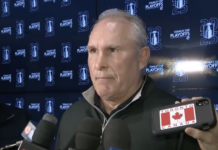
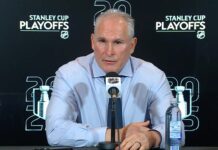











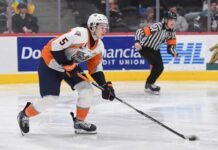



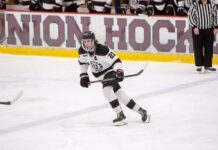



![Two Down, Two to Go for the Maple Leafs – MLHS Podcast EP91 [Now with Video]](https://mapleleafshotstove.com/wp-content/uploads/2025/04/maxresdefault-3-218x150.jpg)



